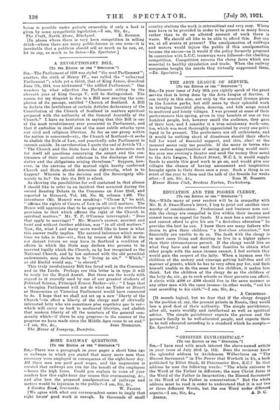EDUCATION AND THE POORER CLERGY. [To ma EDITOR OF THE
" SPECTkTOR."3
Sin,—While many of your readers will be in sympathy with Mr. R.. S. Swan-Mason's letter, I beg to point out another view worthy of consideration. Professional and business men out- side the clergy are compelled to live within their income and cannot issue an appeal for funds. If a man has a small income and cannot afford to give his son "a first-class education" he provides the best he can. I know there are many fathers who desire to give their children "a first-class education," but financially are unable to do so. The fault with the clergy is in most eases living and desiring to live in a higher sphere than their circumstances permit. If the clergy would live on what they have and not want their families to obtain what other people with the same income cannot, I feel certain they would gain the respect of the laity. When a layman sees the children of the rectory and vicarage getting half-fees and all manner of grants, which he has to very often pay for, and finds himself unable to do the same for his children, it makes him think. Let the children of the clergy do as the children of the laity do, viz., go to such schools as their parents can afford. A cleric with .2200 or .2300 should live in the same manner as any other man with the same income—in other words, "cut his coat according to his cloth."—I am, Sir, &c.,
A CHURCHMAN.
[It sounds logical, but we fear that if the clergy dropped to the position of, say, the peasant priests in Russia, they would lose a good deal of their authority. The simple parishioner, after all, wants worldly and intellectual as well as spiritual advice. The simple parishioner expects the parson and the parson's family to be well-educated people, and expects them to be well educated according to a standard which he accepts.— En. Spectator.]


































 Previous page
Previous page